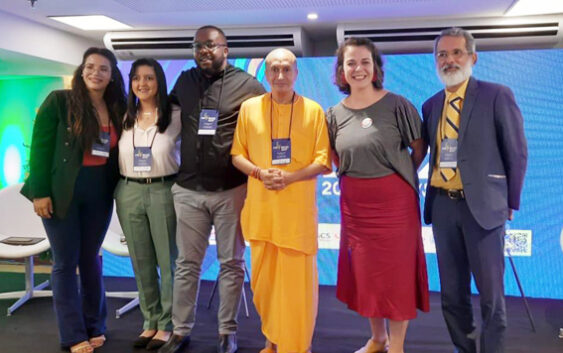Integrating Vedic Wisdom into Policy and Practice to Nurture Global Equity

Gauranga Das Prabhu, Director Govardhan Ecovillage delves into how incorporating Vedic knowledge, which emphasizes the importance of food and unity, might transform policy to promote global fairness. Recognizing food as a fundamental aspect of life and adopting the Vasudeva Kutumbakam principle – the world as one family – paves the way for a more just and inclusive society.
In today’s interconnected world, the pursuit of equity is seen as a moral necessity that transcends borders and ideology. It invites us to explore ancient knowledge while accepting modern realities and seeking answers rooted in compassion, collaboration, and systemic transformation. We can pave the way to a more inclusive and fair society by relying on both the rich weave of Vedic wisdom and modern discoveries.
Vasudeva Kutumbakam, or the idea that ‘the entire world is one family’, is central to the Vedic ethos. The premise of Annam Bahu Kurvita is central to the principle of producing and distributing food abundantly. This profound knowledge emphasizes the essence of civilization itself: the sharing of resources for the general good. In embracing these concepts, we acknowledge that life sustains equitable access to resources, particularly food.
However, as we confront the stark reality of global inequality, it becomes evident that systemic injustices persist. Rooted in historical legacies of colonialism, discrimination, and imperialism these disparities pervade wealth, income, and resource access worldwide. The statistics paint a sobering picture: the top echelons or upper class amass a disproportionate share of wealth, leaving the marginalized struggling for the most basic necessities.
Addressing these ingrained disparities requires a diverse strategy. For example- events such as C20, a vital part of the G20 process, aim to engage in meaningful discussions, consolidate policy documents, and devise effective advocacy strategies for the same. Affirmative action measures, such as India’s MGNREGA and Brazil’s social inclusion policies, show signs of improvement. Similarly, Kerala’s decentralized planning approach demonstrates the transforming force of local empowerment, resulting in demonstrable advances in education, healthcare, and women’s empowerment.
Education appears as an effective tool and technique for overcoming biases and developing empathy. By adopting anti-bias education and inclusive curricula, we can raise a generation that understands the nuances and complexities of intersectionality and recognizes the different identities that shape and affect an individual’s experiences. We may address structural inequities and promote fairness in a variety of contexts by implementing policy reforms and engaging stakeholders.
Numerous policy ideas exist, ranging from international collaboration to address tax havens to a Universal Basic Income. These policies, which are based on a dedication to economic stability and inclusivity, offer hope for a more fair future. But there are many obstacles in the way, such as political resistance and lingering effects from the past, which call for coordinated efforts and unshakable resolve.
We have to take the call to action found in Vedic wisdom seriously as we work through the challenges of our day. We can overcome barriers and create a global society based on justice and compassion by promoting a sense of unity and sharing. This will in turn create a more equitable and welcoming world where the teachings of Vasudeva Kutumbakam light the way to a better future.


